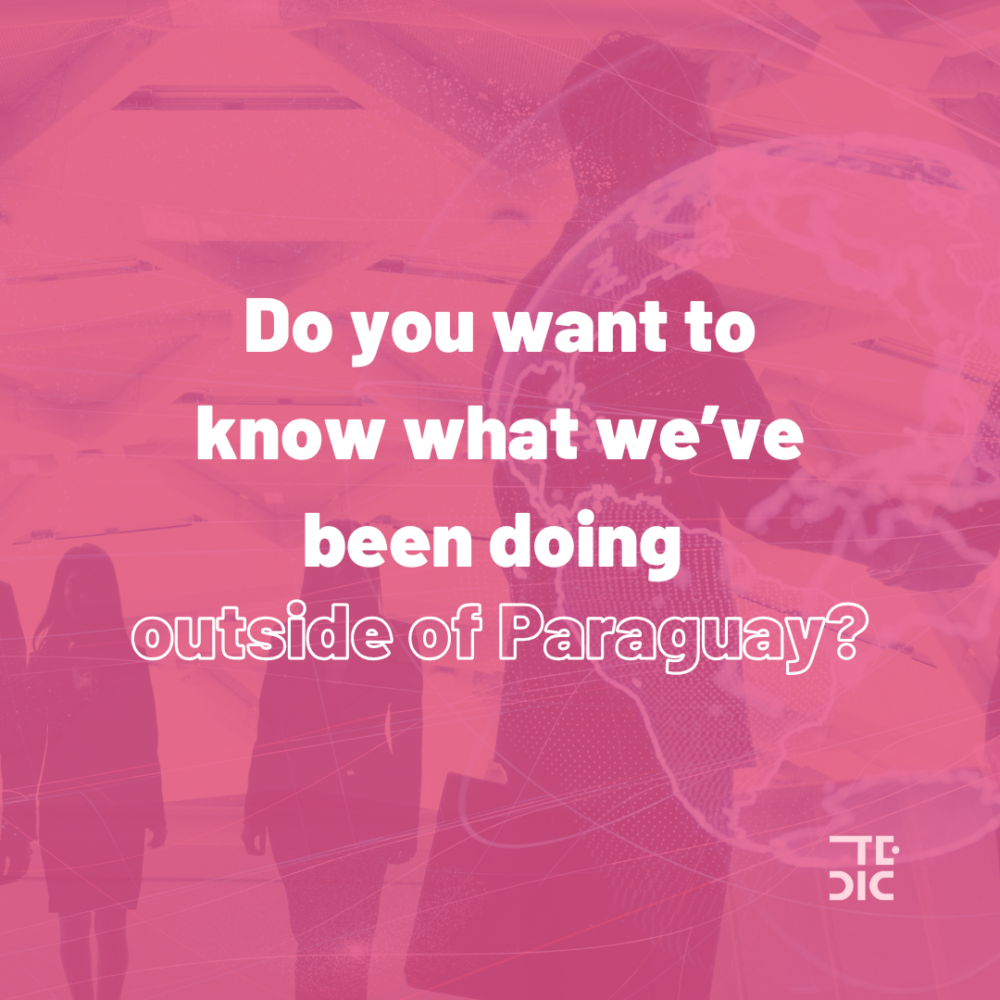
Our commitment to the defense of digital rights is not limited only to the national level. We also actively participate in various international contexts and events, seeking to influence the creation of public policies that protect and guarantee human rights in the digital environment. Complementing our national advocacy initiatives for this period and the international advocacy work already carried out during the first months of the year, below we present a summary of our international advocacy activities conducted between June and September 2024. These activities are organized by month:
June: Privacy, democracy and regulation of digital platforms
June was marked by intense international activity that allowed us to strengthen our advocacy on issues such as the regulation of digital platforms, surveillance in the digital environment, and the defense of freedom of expression.
TEDIC participated in the II Seminario Big Tech, Información y Democracia, held in Bogotá between June 6 and 7. Organized by OBSERVACOM and the Foro I&D, this event brought together experts from the region to discuss the democratic regulation of large digital platforms, the impact of recommendation algorithms on journalism, and the deployment of artificial intelligence (AI) in the information and communication space.
Maricarmen Sequera, executive director of TEDIC, participated in the panel “Iniciativas de regulación democrática de las grandes plataformas digitales”, where she outlined the challenges Paraguay faces in this area and how these problems resonate throughout Latin America.
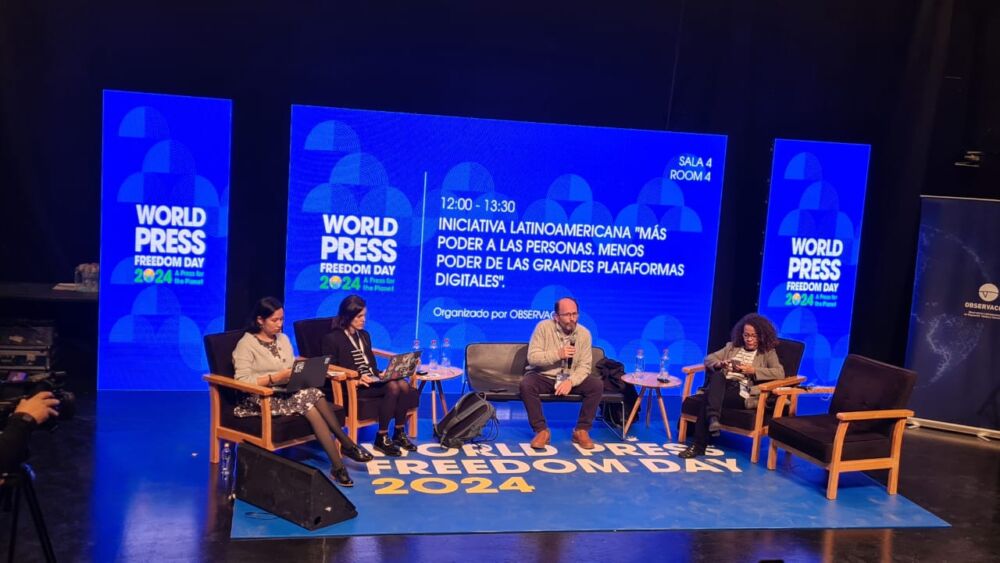
Simultaneously, Pamela Peralta, coordinator of the technology and gender area, and Lupa Alonzo, TEDIC’s digital security expert, were also in Bogotá, participating in the Workshop Insightful, organized by Internews in collaboration with Fundación Karisma. In this instance, TEDIC presented a strategic litigation case on the use of facial recognition in Paraguay and gained insights into Blue Team Tools (BTTs), technological defense tools against surveillance. This event was key to strengthening our privacy protection strategies in a national and regional context.
One of the highlights of June was our participation in the 54th OAS General Assembly, held in Paraguay from June 26 to 28. Alongside key actors from the OAS and the organization Access Now, TEDIC organized a side event focused on promoting the integrity of information and defending the Inter-American Democratic Charter. This meeting allowed us to discuss strategies against disinformation in electoral contexts, a high-priority issue in the region. In addition, we explored the possibilities of creating a digital rights coalition in future OAS General Assemblies, which would help strengthen civil society’s involvement in defending human rights in the digital environment.

In the context of the OAS Assembly, we also participated in a meeting with representatives of the Inter-American Commission on Human Rights (IACHR) regarding the human rights situation in Paraguay, organized by the United Nations Information Center in Asunción. During this exchange, we describe the challenges for freedom of expression and digital rights in Paraguay, emphasizing the urgent need to improve the regulatory framework to protect these rights. Commissioners such as José Luis Caballero and Pedro Vaca attended the meeting and showed great interest in TEDIC’s investigations.
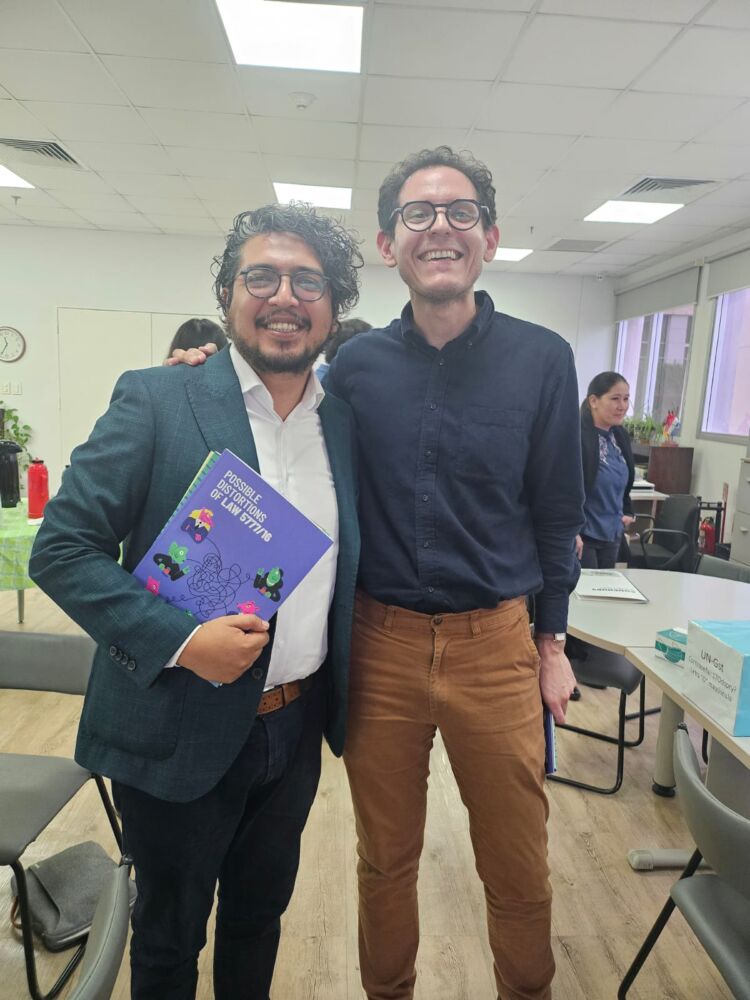
The relevance of Law 5777/16 and its impact on freedom of expression was once again brought to the forefront during a specific meeting with Pedro Vaca, Special Rapporteur for Freedom of Expression. This session, led by Alejandra Peralta, lawyer and human rights defender in Paraguay, allowed TEDIC to present the challenges posed by this law in Paraguay, highlighting how it affects the practice of journalism and access to public information. This discussion was key for the Rapporteur to integrate our concerns in his monitoring of freedom of expression in the region.
At the end of the month, we participated in an interactive virtual workshop on open data for electoral integrity, organized by the National Democratic Institute (NDI). In this event, we shared our experience in the use of open data to monitor online political ads, reinforcing their commitment to transparency and fairness in Paraguay’s electoral processes
In addition, within the framework of the World Digital Development Forum, Pamela Peralta, coordinator of gender and technology projects, participated in the event Crafting the Future: Unmasking Perpetrators and Standardising Data Against OGBV. During this virtual forum, we shared our work in the Women Rights Online Coalition, focusing on the challenges facing the fight against technology-facilitated gender-based violence (TFGBV).
Finally, we were present in London, at the annual meeting of Privacy International (PI), a global benchmark in privacy and technology issues. TEDIC has been a member of the PI’s internal network since 2018 and collaborates annually on the network’s strategic plan, where the roadmap on Internet privacy is defined alongside other members. On this occasion, Maricarmen Sequera participated at the panel discussion on gender and presented our research on the misrepresentation of the application of law 5777/16 and its impact on the exercise of freedom of expression in Paraguay.
July: Labor rights, personal data and regional coordination
During July we participated in panel discussions, international statements and training sessions on issues of labor rights, personal data protection, political spending on social networks and regulation of autonomous weapons.
On July 4 and 5, we participated in the first meeting of the Red Arandurã, organized by the MERCOSUR Institute for Public Policy on Human Rights (IPPDH) in Buenos Aires. This event brought together researchers and specialists in human rights with the purpose of coordinating rapid responses to emergency situations. In this context, we shared our research from the series “Tecnología y elecciones”, highlighting the importance of working on evidence-based public policies to ensure confidence in electoral processes in the region.
Subsequently, we attended the Internews Direct Meeting in La Paz, Bolivia, where we addressed issues related to digital identity and the challenges facing the approval and implementation of legislation on personal data protection. As TEDIC, we presented our campaign Mis Datos, Mis Derechos, highlighting the importance of personal data protection in Paraguay, and participated in debates on how to advance in the advocacy for a comprehensive law in the region.
The defense of labor rights was also on our July agenda. We participated in the event Labour Rights, held in Río de Janeiro by the Solidarity Center and Derechos Digitales. This meeting brought together unions, labor lawyers, and civil society organizations to discuss how labor in digital platforms is becoming increasingly insecure and low-paid. TEDIC exposed the importance of protecting the personal data of workers on platforms such as Uber and OnlyFans, and pointed out the need to regulate these platforms to improve working conditions and protect the privacy of their workers.
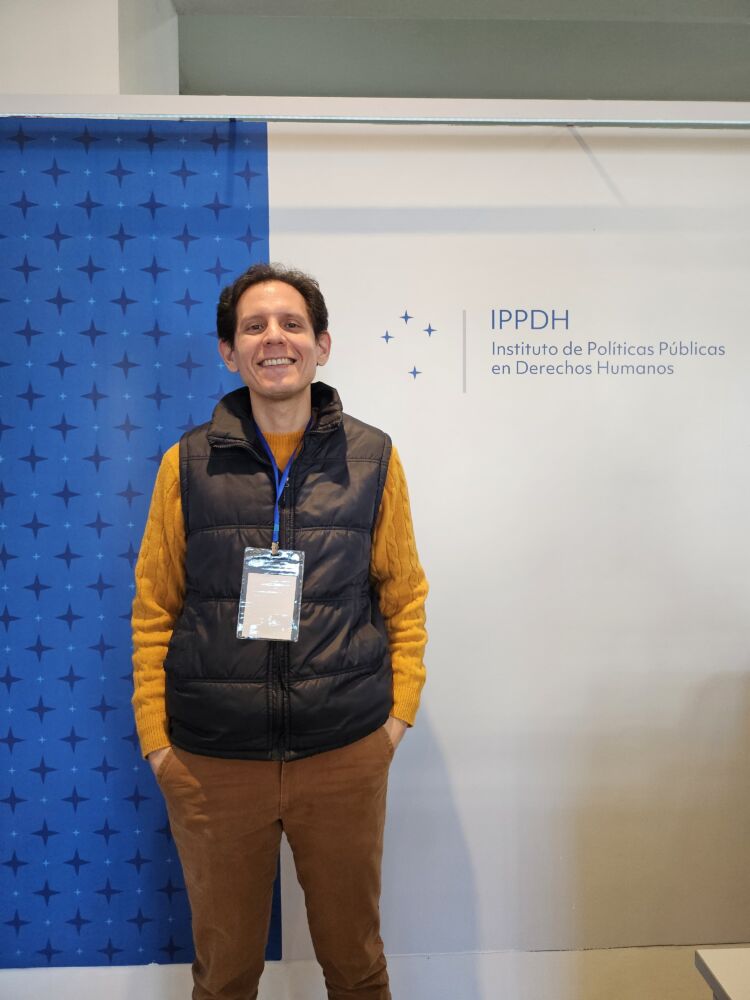
On July 17, we participated in a class at the Faculty of Exact Sciences of the University of Buenos Aires (UBA), under the title “La industria de la influencia política en Paraguay. Investigaciones sobre el gasto político en redes sociales”. During the class, we shared the results of our research on political spending in social media and its impact on electoral transparency in Paraguay.
We continue our advocacy by joining the global cause for freedom of access to the Internet. TEDIC signed the petition for the restoration of the Internet in Bangladesh, together with the #KeepItOn Coalition and other civil society organizations. As part of our commitment to the defense of digital rights globally, in this petition we urge the authorities of Bangladesh to guarantee unrestricted access to the Internet during the student protests.
Furthermore, at TEDIC, we are part of Meta’s Trusted Partner program in Paraguay, actively working to recover the accounts of activists, journalists, and human rights defenders at risk on the company’s different platforms. For this reason, in July, we participated in the LAC Trusted Partner Summit 2024 in Buenos Aires, where we discussed improvements in the reporting channel, a tool that allows coordinated work between the platform and human rights organizations responsible for reporting cases that violate Meta’s community policies. At the event, our Head of Community, Lía Rodríguez, presented the particularities of the more than 10 cases of account recovery that we have already accompanied throughout this year and a half of work. She addressed the specific challenges of Paraguay, especially in the protection of the most vulnerable communities, such as journalists, human rights activists, women and members of the LGTBIQ+ community.
At the end of July, we participated in the fifth module of the Introduction to Humanitarian Disarmament Course at the Federal University of Latin American Integration (UNILA) in Foz do Iguaçu, Brazil. During this event, we presented all our resources from the international Stop Killer Robots campaign, highlighting the risks of autonomous weapons and their impact on human rights. In addition, we displayed our exhibition “Re(x)istentes to digital dehumanization”, translated into Portuguese, seeking to raise awareness about the dangers of digital dehumanization in the use of autonomous technologies.
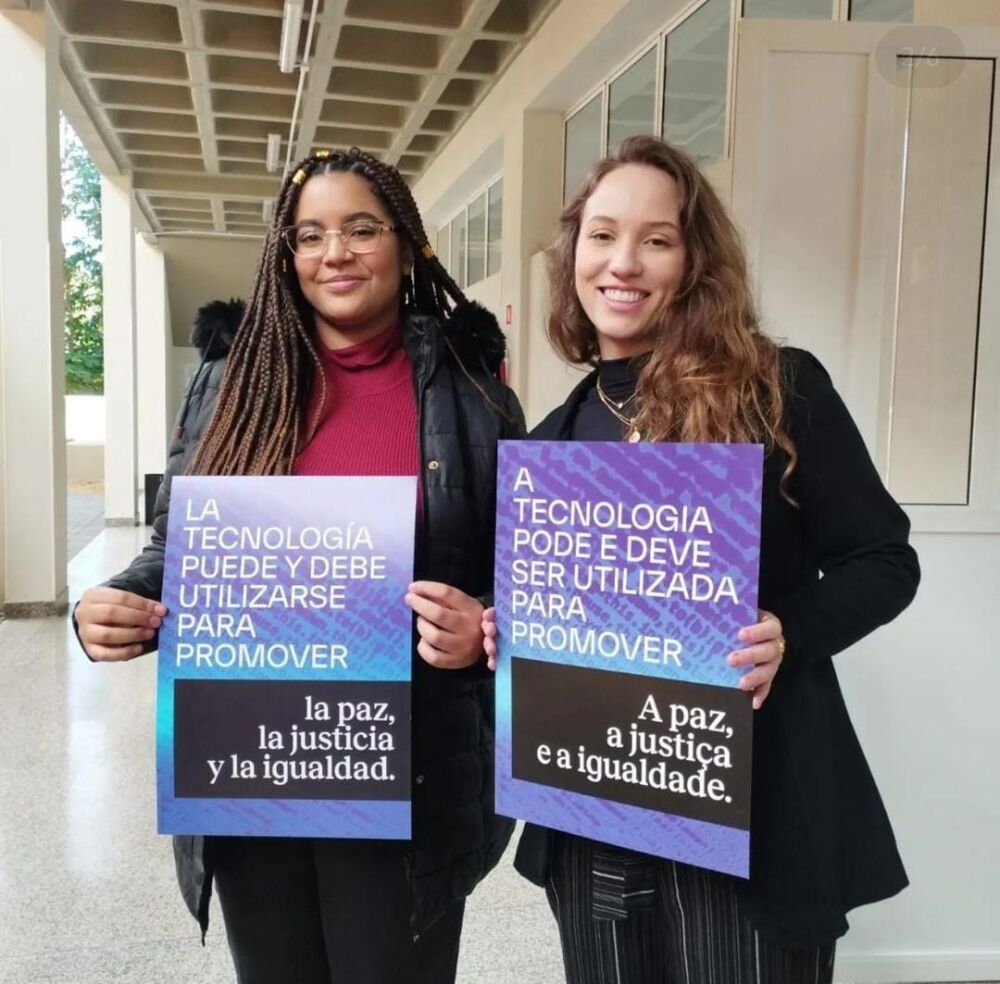
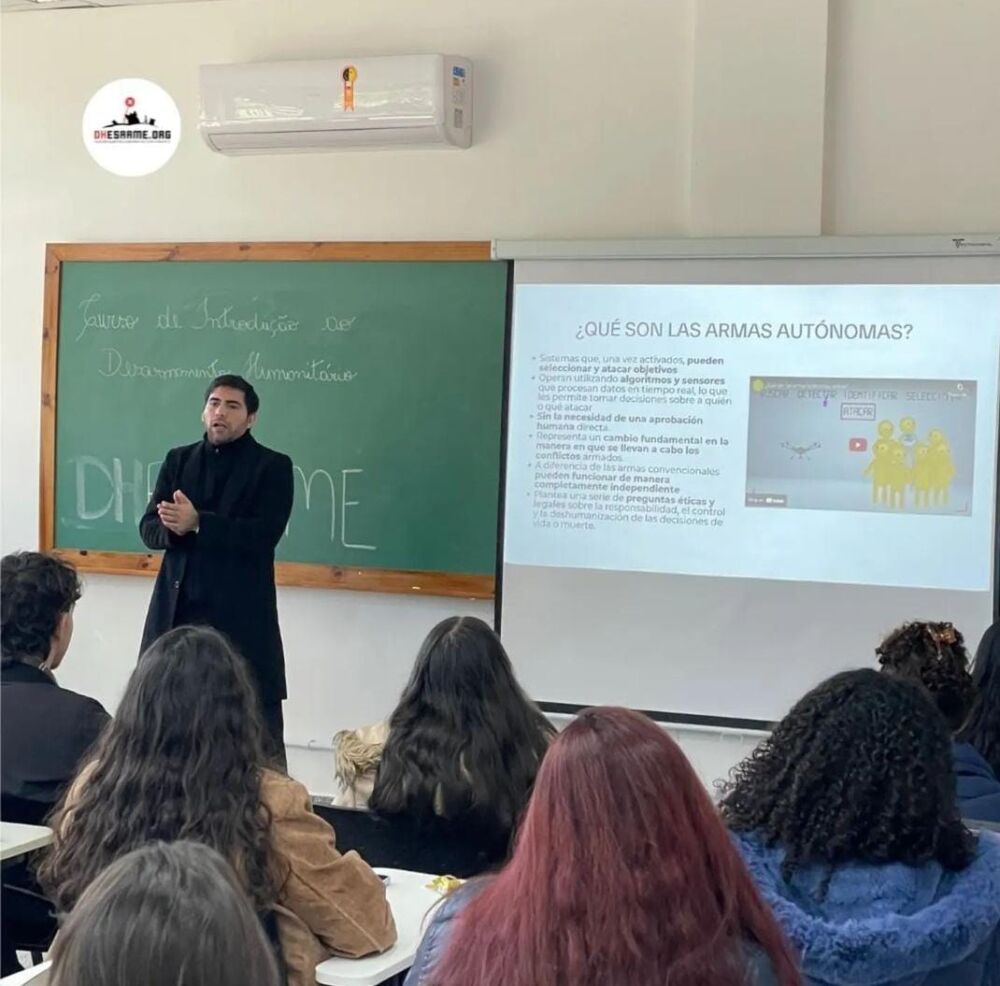
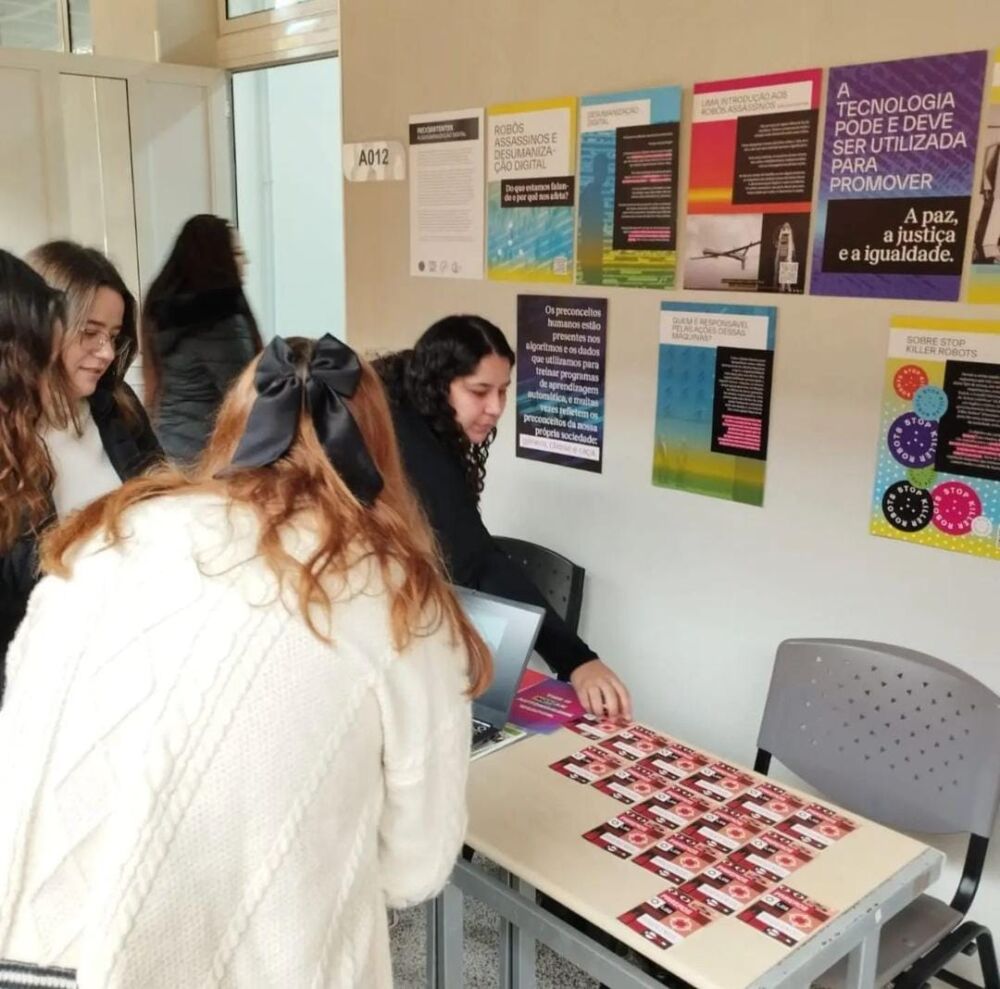
In July we also signed the Civil Society Joint Brief on the UN Global Digital Compact, a document in which we expressed our concerns about the evolution of the GDC process from a human rights perspective. The paper criticizes the lack of transparency in the latest review of the GDC1 and emphasizes that the outcome of the document does not reflect the realities of our communities in the Global South.
Finally, on July 30, we participated in a class organized by the MERCOSUR IPPDH on mass media and new technologies. Maricarmen Sequera, executive director of TEDIC, gave a class on the convergence between mass media and digital platforms, highlighting the impact of algorithms on freedom of expression and information diversity. The class also addressed the risks of disinformation and the importance of promoting greater transparency and regulation in the digital environment.
August: Artificial intelligence, internet shutdowns and cybercrime
During the month of August we participated in meetings, events and panels that addressed the issue of Internet shutdowns, digital rights in critical environments, and regional policies on cybercrime. We also expanded our participation in discussion forums on artificial intelligence and the regulatory challenges facing the region.
We began the month by participating in the Meeting on Internet Shutdowns, organized by Fundación Karisma in Bogota, Colombia. This event brought together experts from several countries in the region to discuss methodologies for identifying and measuring Internet shutdowns, a phenomenon that seriously affects human rights in the context of protests and conflicts, both regionally and globally. Throughout the two days of the meeting, we shared our experience in Paraguay, presenting the results of our research conducted in 2023. In addition, we joined discussions on how to address these outages in countries such as Cuba, Venezuela and Mexico, where Internet shutdowns are also used as a tool of repression.
As part of our work with AlSur, a consortium of which we are a member, we signed the AlSur’s Open Letter on the International Convention on Cybercrime. Together with other organizations in the region, we expressed our deep concern about the text of the Convention approved on August 8, 2024, which represents a step backwards in human rights standards in Latin America. For more than two and a half years, we dedicated significant effort to ensure that this draft respected international human rights standards, but the final result has ignored these recommendations, threatening the exercise of digital rights in the region. For this reason, along with all AlSur member organizations, we urge Latin American States not to adopt or ratify the first UN Convention on Cybercrime as it contravenes their international human rights obligations.
We also joined a collective statement against the closure of civic space and the abuses committed by the Venezuelan government in the context of the July 28th presidential elections. We believe that repression, violence and arbitrary detentions seriously affected the human rights of thousands of people in the country. AlSur strongly denounces the abusive use of technology to silence dissenting voices in Venezuela, demanding guarantees for secure communication and free access to information.
In mid-August, we took part in a Buenos Aires workshop on governance and regulation issues, organized by the Centro de Estudios de Libertad de Expresión of the Universidad de Palermo. The panel discussion in which we participated addressed gender-based political violence and its relationship with freedom of expression in Argentina, Paraguay and Mexico. Here, we shared our research on technology-facilitated gender-based violence in politics and highlighted the need for a balance between protection against violence and freedom of expression.
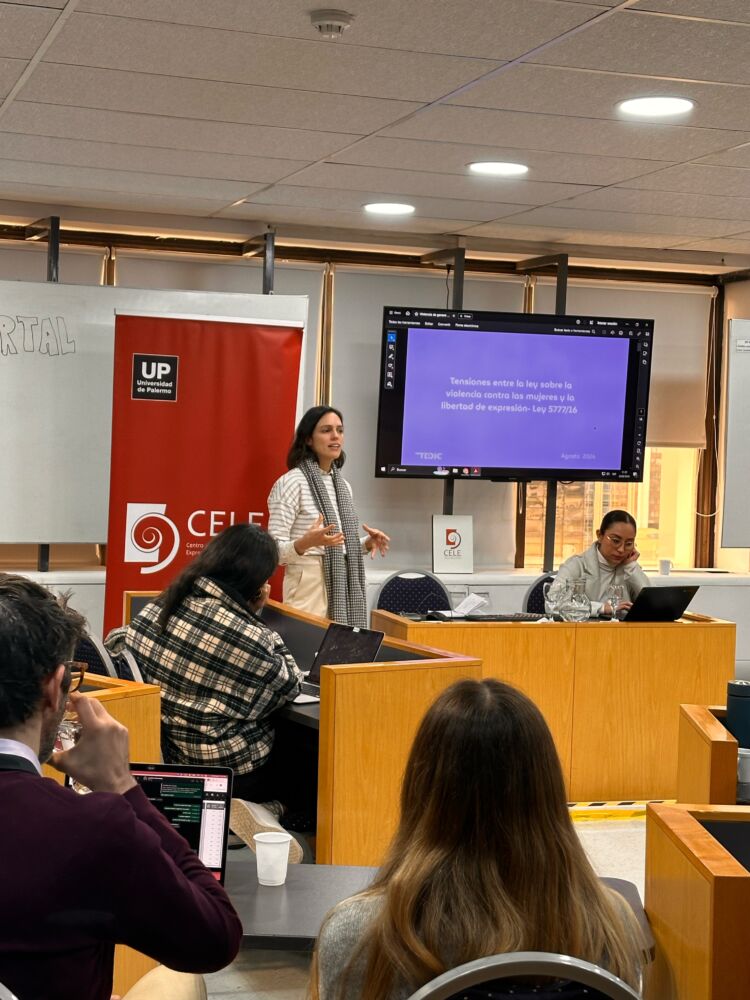
In the context of the AI Week organized by the Iniciativa Latinoamericana por los Datos Abiertos (ILDA), TEDIC participated in the discussion “Human rights and AI governance in Latin America”. In this forum, Maricarmen Sequera, executive director of TEDIC, shared the challenges Paraguay faces in developing regulatory frameworks for artificial intelligence. The discussions held during the event highlighted the need for governance centered on human rights and examined the diverse impacts of AI on vulnerable populations.
September: Summit of the Future and digital rights in Latin America
The Summit of the Future 2024, organized by the UN between September 19 and 24, was the highlight of this month’s event. The main goal of the summit was to adopt a Pact for the Future, which includes two annexes: a Global Digital Compact (GDC) and a Declaration on Future Generations, documents designed to guide technological governance in the coming years. TEDIC, as a member organization of AlSur, played an active role in the dialogues and statements related to the Global Digital Compact (GDC).
The Action Days included debates and bilateral meetings with representatives from various governments and civil society organizations, in which Maricarmen Sequera, executive director of TEDIC, actively participated. She engaged in discussions about the impacts of technology on human rights, meaningful connectivity, and the regulation of artificial intelligence. Here, TEDIC highlighted the urgency for the Global Digital Compact to reflect the realities and needs of the Global South. Throughout several sessions, we insisted that any framework for technological governance must prioritize the protection of human rights and digital equity, rather than allowing big tech platforms to continue concentrating power and influence without accountability.
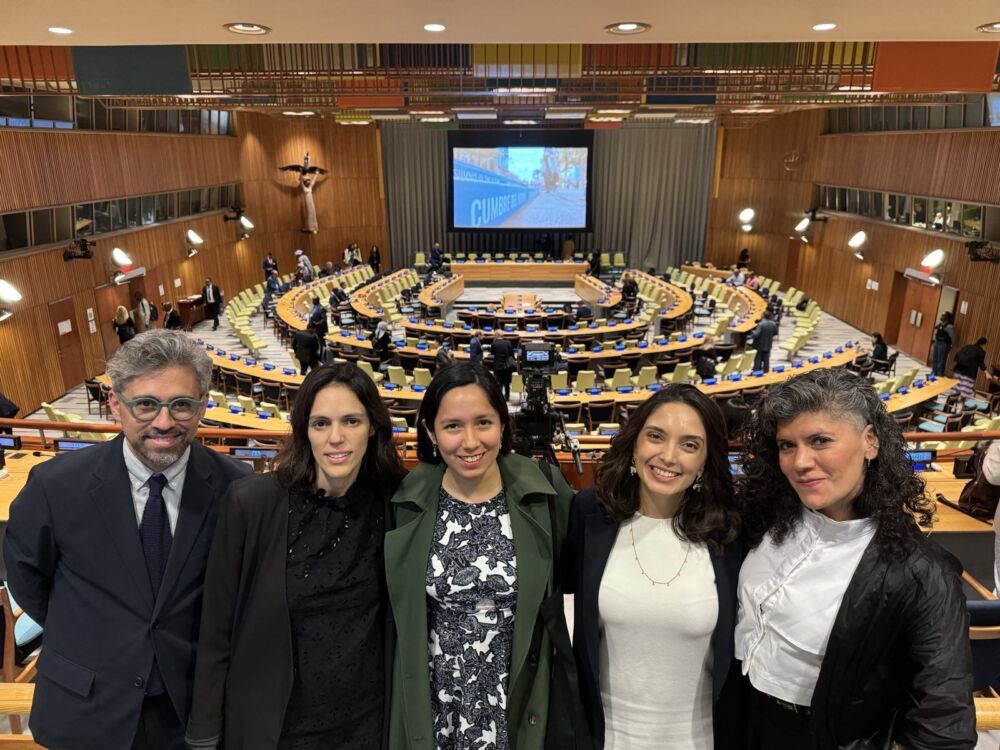
In addition, we joined the Civil Society Coalition on Information and Democracy. This coalition works for democratic guarantees in the information and communication space on a global level, and is based on the International Declaration on Information and Democracy. Our participation reinforces our commitment, both locally and internationally, to the protection of human rights in the digital environment and to the fight against disinformation.
As a member organization of this Coalition, we signed the Call to Action: Key Priorities to Ensure Information Integrity in the AI Era at the Ministerial Conference on Information, Democracy and AI, which took place in New York on the margins of the UN General Assembly. In this call to action, we urged Member States to recognize the risks that artificial intelligence poses to information integrity and to take concrete steps to ensure that AI serves democracy and does not undermine it.
Next steps
The challenges are many: from the regulation of large digital platforms and the protection of personal data to the fight against disinformation and technology-facilitated violence. However, we remain firm in our commitment to building alliances, strengthening regulatory frameworks, and promoting coordinated advocacy work with other organizations in the region and around the world.
As we move into the last quarter of the year, we will continue working to expand our advocacy both in Latin America and globally, with the conviction that only through a collaborative and multi-sectoral approach can we effectively address the current challenges of the digital environment and guarantee a free, safe, and accessible Internet for everyone.
1 Prior to discussion at the Summit of the Future 2024.


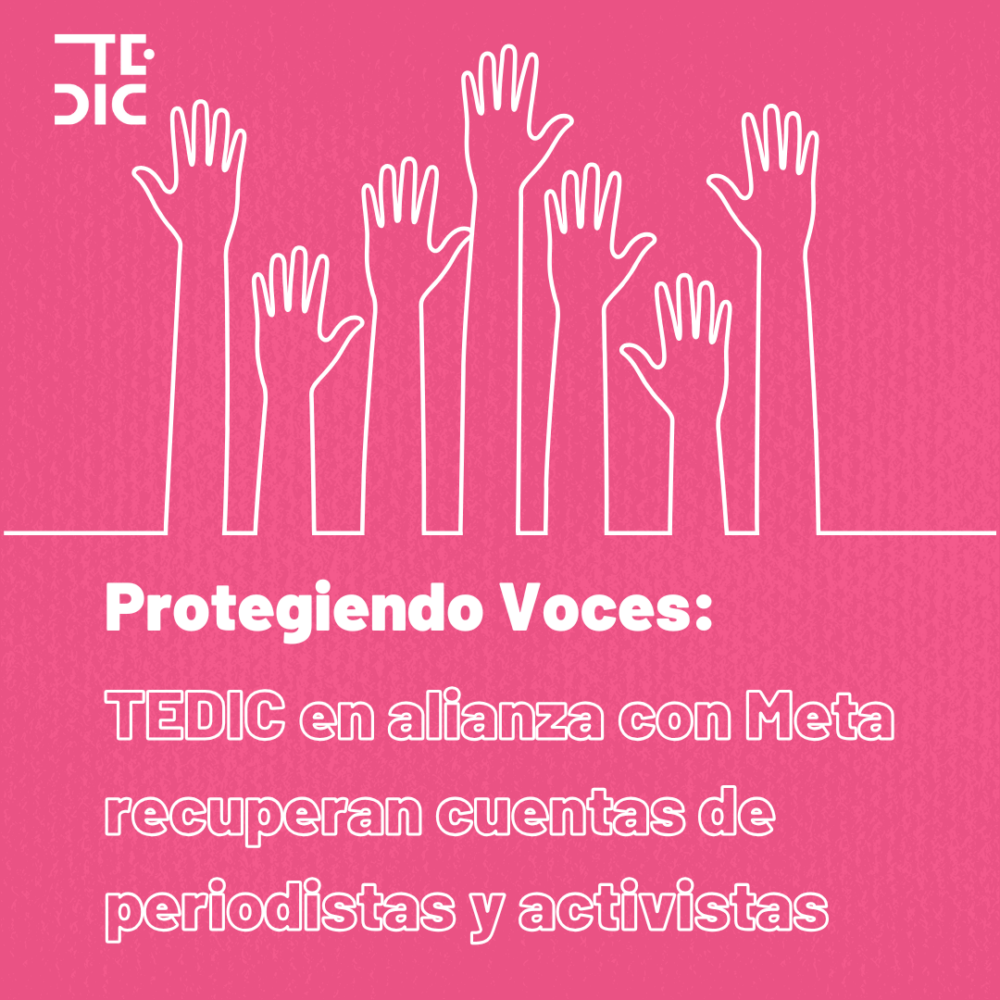 Defending those who defend us
Defending those who defend us